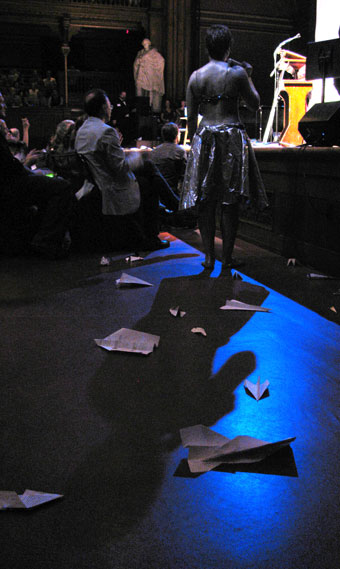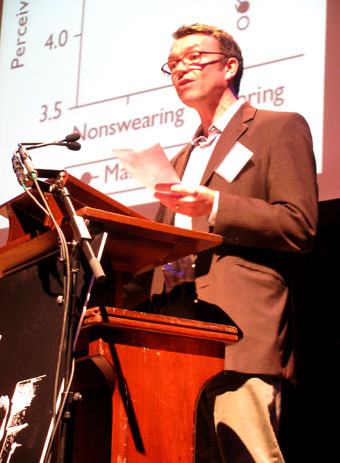Cursing helps, fruit-bat fellatio and other 2010 Ig Nobel Award winners

Katrina Rosenberg, a human spotlight at the 2010 Ig Nobel Awards ceremony, held Thursday in Harvard’s Sanders Theatre, faces the stage Thursday after the first throwing of paper airplanes. (Photo: Marc Levy)
Scientists and researchers from around the world gathered Thursday for the year’s Ig Nobel Prize ceremonies, celebrating such astonishing advances as confirming that swearing relieves pain, that organizations would be more efficient if they promoted people at random and that whale snot is best collected using a remote-controlled helicopter.
There was a bit of satire in the 10 awards, as usual — this is officially the 20th year of the first annual event — in the presentation of the chemistry and economics prizes. British Petroleum was among the winners for the finding that oil and water do mix, and the executives and directors of Goldman Sachs, AIG, Lehman Brothers, Bear Stearns, Merrill Lynch and Magnetar were awarded for “creating and promoting new ways to invest money — ways that maximize financial gain and minimize financial risk for the world economy, or a portion thereof.”
Also as usual, the awards took place at Harvard’s Sanders Theatre in Harvard Square before a crowd of about 1,200, and there were many other traditional elements in place: actual Nobel laureates were on hand to present the awards; living statues followed people around with flashlight “spotlights”; winners got 60 seconds to speak; and when they ran over time, they were admonished by Miss Sweetie Poo, 8, who crossed the stage to the lectern to tell the honorees “Please stop. I’m booooored.”
New to the ceremonies were the themes of “bacteria” and performances by Evelyn Evelyn — Amanda Palmer and Jason Webley in their conjoined-twin act (with Palmer’s husband, writer Neil Gaiman, acting as emcee) — and of “The Bacterial Opera,” about the bacteria on a woman’s tooth and that woman. (Also new: Returning winners were allowed to give tweet-length speeches. Elena N. Bodnar, of Illinois and Ukraine, was allowed to speak longer about her Emergency Bra gas mask, and several men on stage demonstrated the product.)
For the first time, winners also got a cash prize: 10 trillion Zimbabwean dollars. It fits the evening’s irreverent tone; after what he calls “the pointless preamble,” Abrahams — in tux and top hat — introduced the awards ceremony by saying, “Let’s get this over with.”
Eight of the 10 winners came to Cambridge at their own expense, including from London, Mexico, Hawaii, Italy, New Zealand and The Netherlands, said founder and organizer Marc Abrahams, editor of the Annals of Improbable Research, and there was media attention from around the world as well. It is also traditional that the awards draw greater attention internationally, since much of the world is science-crazy, than domestically, since the United States is less so.
The event is streamed live, then shown in edited form, on YouTube. The winners can explain themselves for longer than 60 seconds — they get a whole five minutes — in free lectures Saturday in MIT’s Building 10, Room 250, at 77 Massachusetts Ave.

Richard Stephens, of Keele University in the United Kingdom, accepts his award Thursday for his team’s findings that swearing really does help ease pain. (Photo: Marc Levy)
The scientific documentation of fellatio in fruit bats won the biology prize. Gareth Jones, of the University of Bristol, United Kingdom, was on hand to collect for a larger team.
The discovery that symptoms of asthma can be treated with a roller-coaster ride won the medicine prize. Accepting were Simon Rietveld of the University of Amsterdam in The Netherlands and Ilja van Beest of Tilburg University in The Netherlands.
The use of slime mold to determine the optimal routes for railroad tracks won the transportation planning prize. Accepting were Toshiyuki Nakagaki, Kentaro Ito, Atsushi Tero, Mark Fricker and Dan Bebber, some of who won the Ig Nobel Prize for physics in 2008 for finding slime mold could solve puzzles.
Determining that microbes cling to bearded scientists won the public health prize. A representative collected the prize for three scientists at the Industrial Health and Safety Office at Fort Detrick, Md.
Demonstrating that people fall less frequently on icy footpaths in winter if they wear socks outside their shoes won the physics prize. Accepting was Lianne Parkin, of the University of Otego in New Zealand, part of a university team of three.
A method for collecting whale snot using a remote-controlled helicopter won the engineering prize. Accepting were Karina Acevedo-Whitehouse and Agnes Rocha-Gosselin or the Zoological Institute of London and Diane Gendron of Instituto Politecnico Nacional, Baja California, Sur, Mexico.
Confirming the widely held belief that swearing relieves pain won the peace prize for a team from Keele University in the United Kingdom. collected for the team.
The discovery that organizations would be more efficient if they promoted people at random won the management prize. Accepting were Alessandro Pluchino, Andrea Rapisarda and Cesare Garofalo, of the Universita di Catania, Italy.
Disproving the belief oil and water don’t mix won the chemistry prize for Eric Adams of the Massachusetts Institute of Technology, Scott Socolofsky of Texas A&M University, Stephen Masutani of the University of Hawaii and British Petroleum. No representative of the oil company was on hand to collect.
Creating and promoting new ways to invest money — ways that maximize financial gain and minimize financial risk for the world economy, or a portion thereof — won the economics prize. The winners were the executives and directors of Goldman Sachs, AIG, Lehman Brothers, Bear Stearns, Merrill Lynch and Magnetar, but none were on hand to collect the prize.
